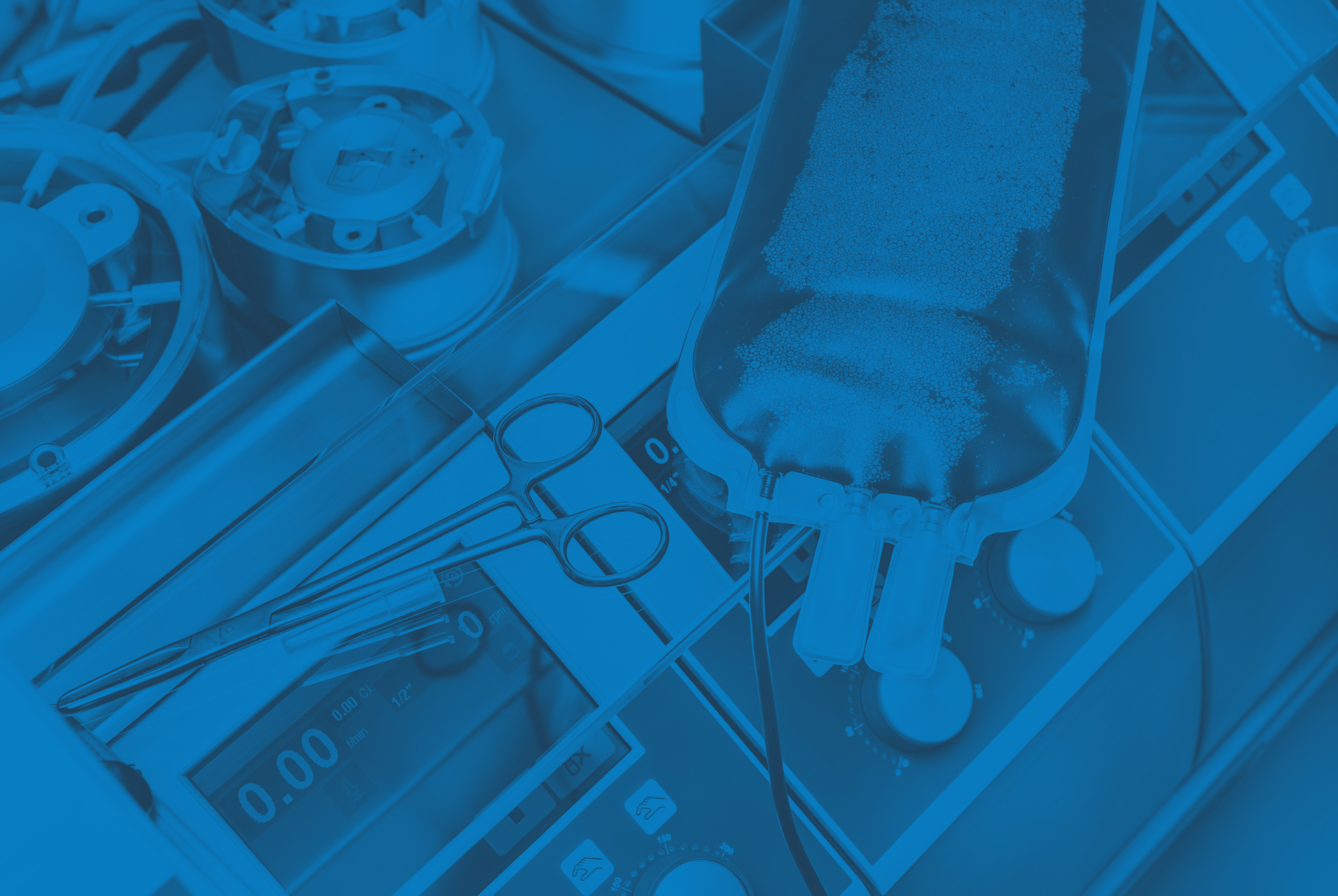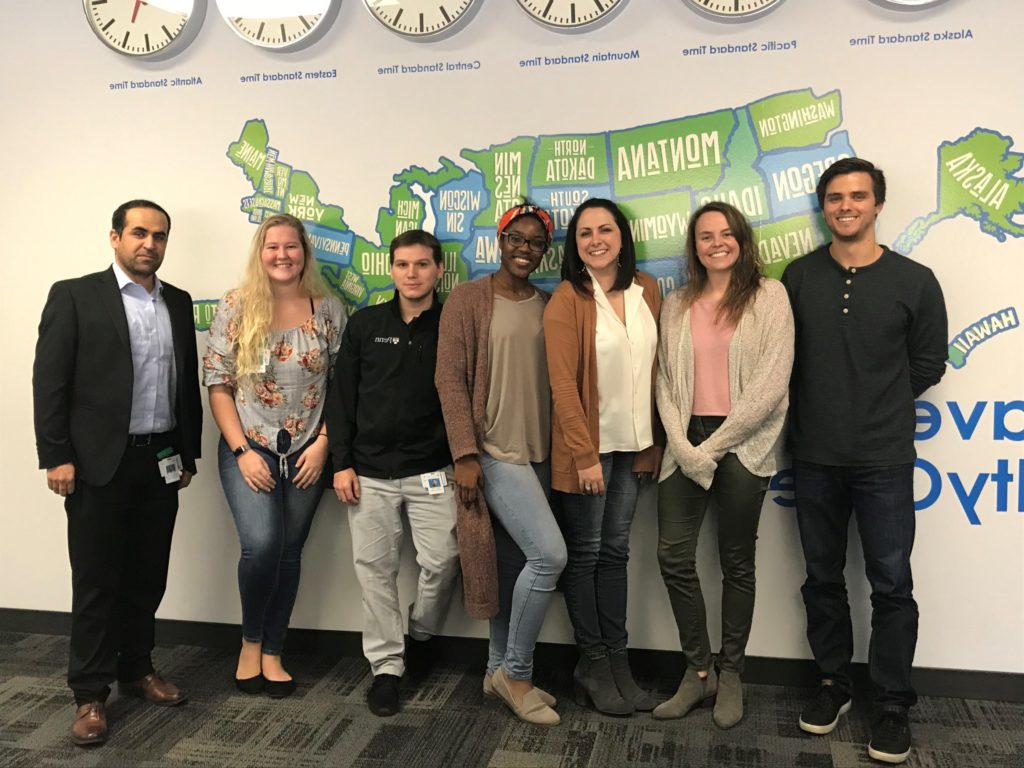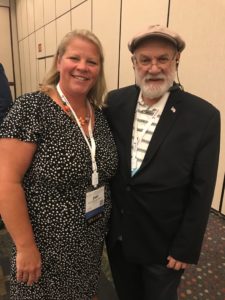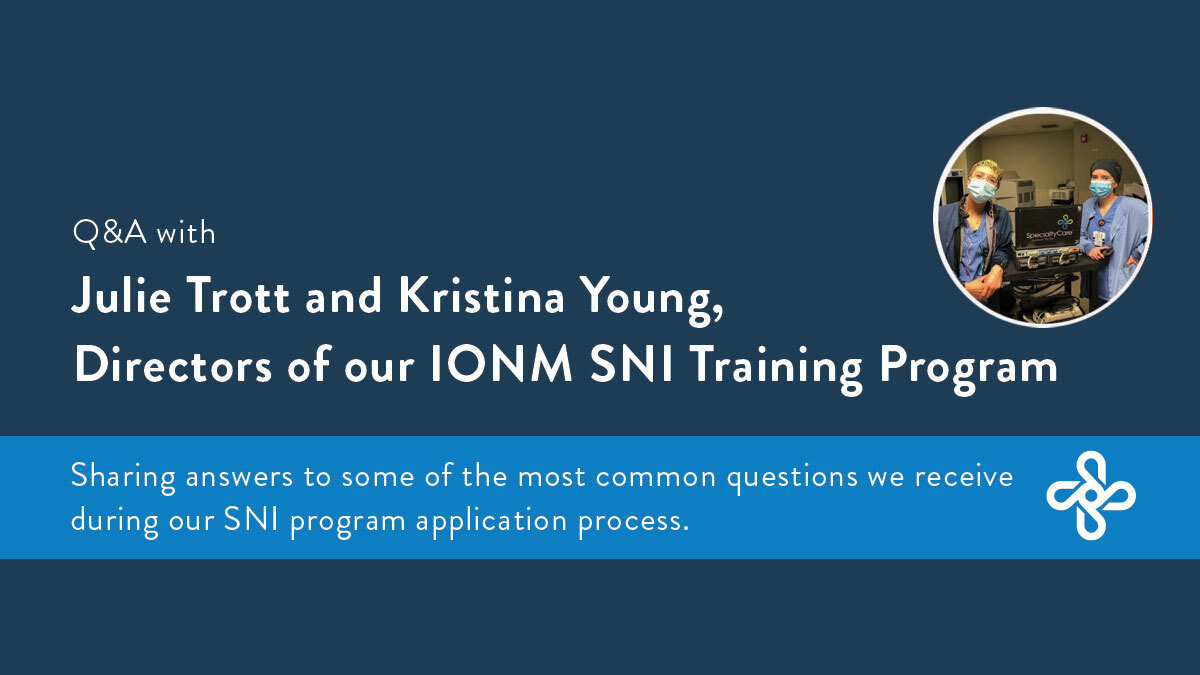
What is Intraoperative Neuromonitoring?
Intraoperative neuromonitoring (IONM) refers to the continuous assessment of nervous system function during surgery using a variety of specialized neurophysiologic tests and measures. The purpose of IONM is to provide the surgical team with information about impending adverse changes in nervous system function, so that timely corrective action can be taken to reduce the risk of lasting injury. The surgical neurophysiologist (SN) plays a vital role in the OR.
The Role of the Surgical Neurophysiologist
The surgical neurophysiologist is an important member of the operating room team. The SN meets with the patient on the day of surgery to perform a brief evaluation, explain IONM and answer any questions that the patient and family may have. In the operating room, the SN prepares the patient for neuromonitoring by applying recording and stimulating electrodes and operates a computerized IONM workstation to collect data using a variety of tests. The SN is supported online by physicians and other IONM professionals who use telemedicine technology to view the same nervous system activity and communicate with the SN in real time. Together this team collaborates to interpret the data and advise the surgical team of the patient’s condition.
START PROCESS HERE
Use the form below to connect with our IONM SN-1 training representative to learn more about the application process.
Who is SpecialtyCare?
SpecialtyCare is a team of passionate, driven people dedicated to making a difference in healthcare. We are one of the nation’s leading providers of outsourced surgical services and one of the largest providers of outsourced intraoperative neuromonitoring in the United States. Currently we provide IONM services to over 800 hospitals and support more than 2,500 surgeons in over 130,000 surgeries each year.
How Does SpecialtyCare Approach IONM Training?
Our surgical neurophysiologists are well educated, highly trained, and have extensive experience in the field. SpecialtyCare is dedicated to hiring talented and motivated people who are eager to learn and start a career in this exciting and rewarding field. As a SpecialtyCare surgical neurophysiologist, you will be in a great position to grow your career while working with highly skilled physicians and surgical teams in a variety of clinical settings and locations.
To get you to that point, we offer full-time, salaried employment coupled with a structured and progressive one-year training program that features a combination of classroom work, laboratory practicums, online instruction and practical training in the operating room designed to prepare you for a career in IONM. Upon completion of the training program, associates are board certified and promoted to the second tier of our IONM clinical career ladder.
PHASE I (3-5 MONTHS)
- IONM Foundations Course
- Nashville Based Classroom & Sim OR Learning
- Introductory OR Clinical Training
- Didactic Assessments & Sim OR Practicums
- Basic Clinical Competency Assessment
PHASE II (6 MONTHS)
- Continued Didactic Training
- 1:1 Clinical Instruction & Mentorship
- Intensive Clinical Training & Competency Assessment
PHASE III (3-5 MONTHS)
- Web-based Didactic Training
- CNIM Preparation Series
- Final Capstone Project
Q&A with Julie Trott and Kristina Young
Directors of our IONM SNI Training Program
We sat down with Kristina Young and Julie Trott to share answers to some of the most common questions we receive during our SNI program application process. We hope this serves not only as a helpful resource to those applying for our program but additionally provides background about our program leaders and what you can personally expect from our training process!
What Happens in the Sim OR?
During their time spent at the Nashville training facility, SNIs utilize the Sim OR in guided simulations to learn the surgical equipment, practice the technical aspects of IONM and, most importantly, role-play the critical interactions between the IONM staff and the rest of the surgical team in a high-stakes OR environment. As recent research suggests, simulation is a critical component of adult learning in healthcare, as it simultaneously implements cognitive, social, and constructivist learning theories.
There’s been a new slogan added to the Sim OR as a cultural flagstone of our educational environment – “In the Sim OR, mistakes are: Expected, Respected, Inspected and Corrected”. As we aim to hire talented and motivated people who are eager to learn and start a career in the exciting and rewarding field of intraoperative neuromonitoring, we also understand the gravity of starting a brand-new career. This motto truly defines our long-standing and historical practice of acceptance and compassion within the learning and development of becoming a surgical neurophysiologist! We are proud to continue fostering an atmosphere of trust, growth, and learning, and we aim to provide a culture of positive learning experiences for each new cohort.
Checking the Vitals with IONM Training Program Graduates
On this episode of Checking the Vitalds, our guests are Jodi Jason and Rikta, who were all surgical neurophysiologists at SpecialtyCare. In this episode, we discuss why they chose to go into intraoperative neuromonitoring as a career, how they found out about it, and then subsequently joined the SpecialtyCare IONM training process, as well as how that training went and what they’ve done since graduating. Enjoy the conversation.
What Will I Learn in Training?
The SpecialtyCare IONM Training Program focuses not only on a technical understanding of data acquisition and measurement, but also on the anatomy and physiology of the nervous system, the sensitivity and specificity of electrophysiological measures in monitoring and mapping structures during complex surgical procedures, and the tools required for effective communication when the stakes are high. Our program is designed to facilitate the competency and clinical acumen of well-rounded surgical neurophysiologists. Prior to board certification preparation, our graduate level training encompasses the following core elements:
Patient Setup
- Explain test procedures to the patient and describe your role.
- Obtain informed consent for IONM.
- Perform a patient interview and brief preoperative functional assessment.
- Prepare the patient for IONM by applying surface and subdermal electrodes.
- Understand the complexity and risks of the surgical procedure, and devise an appropriate multimodality monitoring plan.
- Discuss the monitoring plan with the surgeon and anesthesia team.
IONM Equipment
- Set up monitoring equipment in the OR following biomedical safety standards.
- Adjust recording and stimulation parameters to acquire optimal data.
Intraoperative Monitoring
- Interact with the surgical team to provide timely information about the patient’s neurologic status.
- Understand the physiologic and anesthetic conditions that influence the various IONM modalities.
- Understand the clinical correlations between abnormal IONM recordings, various disease states and surgical injury to the nervous system.
Documentation
- Mark, measure, and calculate information such as signal amplitudes and conduction times following established guidelines and protocols.
- Appropriately record all communication with the surgical team to be represented in the patient’s medical record.
- Save and upload recorded information to SpecialtyCare’s medical record system.
How Does the Training Program Work?
Associates hired for the IONM Training Program are full-time employees of SpecialtyCare. Training consists of classroom work, simulation clinical training and communication training in our fully equipped simulation OR, hands-on clinical training in the OR, and web-based independent learning in order to gain a professional understanding of the IONM field. The milestones of the training program are competency-based, so the timeframe of training does fluctuate from student to student. However, most trainees complete the training program at one year of employment.
- During the training program interview process, opportunities for specific team locations are discussed. Offers for training are usually extended for specific team locations, although “geographically non-determined” offers are also sometimes available.
- Relocation expense reimbursement will be allotted when needed.
- Introductory foundational training is conducted at our Nashville field office, where trainees participate in lecture, discussion, group presentations, demonstration, and simulations in our fully equipped Sim OR environment. Clinical training during this phase may be conducted in the local market, or other markets may be utilized for clinical training as needed.
- All SpecialtyCare Surgical Neurophysiologists must obtain CNIM certification prior to completion of the training program. Please visit ABRET.org for information on this national board certification.

What are the Training Program Position Requirements?

- Bachelors, masters, or doctorate degree.
- A strong passion for caring for patients and advocating for optimal patient care.
- Ability to keep up with a fast-paced and independent learning environment.
- Ability to work flexible hours as scheduled, and to be on-call as scheduled.
- Excellent interpersonal communication skills and organizational skills.
- Ability to work independently, be self-motivated & have a strong desire to learn.
FAQ’s
When SpecialtyCare employees complete the IONM Training Program, they are awarded promotion to SNII status along our internal Career Ladder. Additional opportunities to advance are awarded based on the individual competency spectrum, years of experience, continued education, and overall employment evaluations. Our career pathways encompass clinical and leadership categories, allowing our clinicians countless advancement opportunities in the realms of clinical expertise, management, and/or educational leadership.
Once training starts, we jump right into discussing the anatomical and physiological concepts of the tests we perform. So having a basic understanding of cellular physiology and neuronal conduction is vital . It will also be helpful to refresh yourself on the gross anatomy of the central and peripheral nervous systems, including the brain, brainstem, spinal cord, and major peripheral nerves.
All of our open positions for experienced hires are posted on our website. In general we have open positions all across the country. However, only certain teams are equipped to provide clinical training. Therefore, sometimes we have available positions for SNI trainees that are not posted on our website. We don’t have predictability of where these positions will be until we begin the hiring process.
To find out more about the industry itself, have a look at some of the national organizations’ websites. ASNM.org is a good one. There is also ASET.org and ABRET.org which pertain to a broader scale of Neurodiagnostics. To find out more about SpecialtyCare, go to SpecialtyCareus.com. We also have a medical podcast with interviews of surgeons, leaders in healthcare, and many of our internal associates. Go to SpecialtyCareus.com/medical-podcast/#pod-listen.
SpecialtyCare offers very competitive health, dental, and vision benefits, life insurance, as well as a generous 401k plan with a match. We also offer clinical associates an annual continuing education budget that allows our staff to attend national conferences, take online courses, and participate in other continuing education opportunities. Lastly, following board certification, SpecialtyCare offers tuition assistance and student loan repayment assistance to our associates.
Our program starts off with 8 weeks of foundational training, during which time students begin clinical training at our regional training sites as well as travel to the Nashville headquarters for didactic work and simulations. This foundational course focuses on the basic neurophysiology principles, basic technical competency, and introductory clinical competency. Following the first 8 weeks, students continue their clinical training under the direct supervision of an assigned clinical mentor. Additional academic coursework, including CNIM Prep, is administered via e-distance learning techniques such as live webinars, learning modules, and mobile applications.
In the spirit of full transparency, we like to let our candidates know about the most common obstacles people face in the training program and in the career. Here are some of the aspects of this career that you’ll want to consider before taking the plunge:
- Unpredictable daily scheduling. Most neurophysiologists receive their clinical assignment the evening prior, around 5pm. Sometimes we are assigned short cases; sometimes we are assigned long cases; and sometimes our case assignments can change mid-day. Our case can cancel, or our case can last much longer than expected. When we are assigned to take care of a patient, we take ownership of that case and we do not have “shifts” that guarantee our day will end at a certain time.
- The Operating Room environment. If you’ve never been in an OR before, I can tell you it is cold, sometimes loud, and sometimes surgeries last a very long time. Rarely do we get breaks to use the restroom or eat, and of course you can’t bring food or drink into the OR. It can make for a long day.
- Although SpecialtyCare is designed to minimize clinical travel, sometimes a busy team needs help when another team is having a slow week. Travel is not a usual regular occurrence for most neurophysiologists in our company, but being prepared for this is important. You may be asked to make a day trip, or you may be asked to travel to help another team for a few days.
You don’t have to be a science major, but if you’re not, you’ll want to take some online introductory neuroscience courses before you start our program. As far as the technical and clinical training, if you’re pretty savvy with computers and can learn new software relatively easily, you won’t have trouble with our software. And if you’re a confident communicator who can slow down and reason through problems when things start to get stressful, you’ll likely do well in our simulations and clinical training.
If you are interested in the SNI program, go ahead and apply! One of our recruiters will contact you to discuss what timeframe you’re interested in joining SpecialtyCare. If you’re pending graduation in the next few months, we’d love to talk with you about opportunities after graduation. If you still have a few semesters to finish up, we can stay in contact and consider you for upcoming opportunities.
